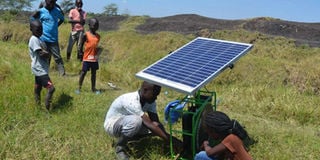Research on solar pumps promises better tidings

Oliver Bill sets up the portable solar pumping system in his farm in Nyando. The solar pumps have less maintenance costs compared to diesel pumps which need fueling now and then. PHOTO | ISAIAH ESIPISU | NMG
What you need to know:
- For the last three years, Future Pump has been working with some 100 farmers in Nyanza and using them to research on how to better the water pump.
- Solar pumping systems in the market lack the battery chamber.
- For solar, the initial investment is higher than diesel pumps, but solar pumps have less maintenance costs compared to diesel pumps which need fueling now and then.
- Successful companies like Future Pump are, therefore, given loans to implement the projects as long as they can raise at least 50 per cent of the amount they are asking for.
On a shiny afternoon last week, Oliver Bill, a 24-year-old former student leader at Moi University, was busy moving up and down to irrigate his 1.3 acres under tomatoes using a portable solar powered pump.
The holder of a degree in strategic management has become a smart farmer, and is perhaps the most ambitious young man in Miguye village in Nyando Constituency, some 10km north of Kisumu town.
“I know the size of my farm is massive compared to that of all the other horticulture farmers in this area. The portable solar pumping system is relatively new as well,” said Bill, who started farming some four months ago.
The solar pump is his latest addition having acquired it recently from Future Pump in a friendly model that made him not feel any pinch.
For the last three years, Future Pump has been working with some 100 farmers in Nyanza and using them to research on how to better the water pump.
The research was part of the work supported by Africa Enterprise Challenge Fund (AECF), a Sh30.4 billion private sector fund that provides funding to enterprises in 24 countries across sub-Saharan Africa.
Through an initiative known as Renewable Energy, Adaptation and Climate Change Technology (REACT), small and medium size companies are asked to write proposals of their innovative business plans, which are then subjected to vetting.
Successful companies like Future Pump are, therefore, given loans to implement the projects as long as they can raise at least 50 per cent of the amount they are asking for.
Victor Ndiege, the Portfolio Manager – REACT, said for the Future Pump research, the 100 farmers purchased the first version of the pump named Sunflower 1 at Sh35,000 with an agreement that the company would collect feedback from them from time to time, and offer free servicing of the equipment.
Using the information collected from the farmers, the company would then modify the gadget further and offer the updated version of the machine to the farmers involved without further charges.
Thanks to the research, the company has come up with two versions known as ‘Sunflower 1 (SF1)’ and 2 (SF2).
SOLAR ENERGY IS MORE SUSTAINABLE
So far, the SF2 which Bill acquired is the latest version of the pump, and is much smaller (20kg) with a solar panel that is collapsible into three parts making it much easier for farmers to transport. It is much more powerful than the SF1, which weighs 28kg.

Bill who purchased two pumps at Sh65,000 each on credit is optimistic that from the tomato crops that he grows, he will clear the debt soon after selling the produce. PHOTO | ISAIAH ESIPISU | NMG
Once the equipment is bought, the company provides spare parts and maintenance warranty at no extra cost for five years.
“Since the technology is subjected to harsh conditions on the farm, no amount of clever engineering will prevent it from breaking down at some point. So, rather than disingenuously portray our pumps as invincible, we have chosen to address this head on and make customer support as routine as our other operations,” said Martina Groenemeijer of Future Pump, adding farmers are allowed up to two year payment mode.
Bill has purchased two pumps at Sh65,000 each on credit. But looking at the crop on his farm, he is optimistic that he would clear the debt soon after selling the tomatoes.
“By March next year, I hope that I would have paid off the debt using proceeds from my tomatoes so that I can focus on other things,” he said, adding that the machine pumps water for up to 500 metres on a flat ground.
Ndiege notes that the solar technology is a more sustainable replacement for diesel and petrol powered generators, which are the most commonly used by smallholders in Kenya and many other African countries.
Jamlick Mutie, a Water Resource Engineer and an irrigation specialist, said solar pumps are the way to go especially for smallholders.
“For solar, the initial investment is higher than diesel pumps, but solar pumps have less maintenance costs compared to diesel pumps which need fueling now and then.”
However, Mutie said that nearly all the solar pumping systems in the market lack the battery chamber, which is a limiting factor for farmers whenever the weather is cloudy.
“Inclusion of the battery will definitely increase farmers’ performance because they need constant flow of water during transplanting and when their crop is at a flowering stage.”





